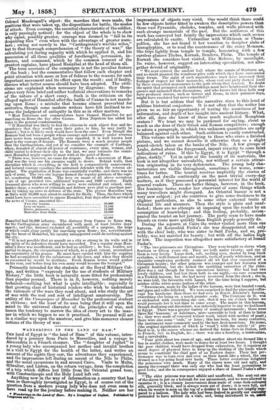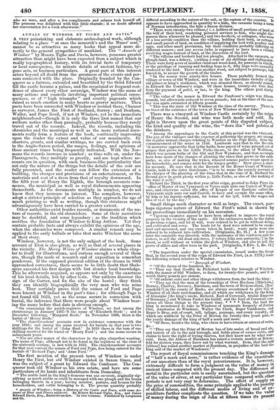WANDERINGS IN THE LAND OF HAM. * TEE land of Egypt
is "the land of Ham" of this volume, intro- duced by a journey from Paris to Marseilles and a voyage to Alexandria in a French steamer. The "daughter of Japhet" is a young lady who accompanied her mother and invalid brother in a visit to Egypt for the health of the latter, and writes an account of the sights they saw, the adventures they experienced, and the impressions left during an ascent of the Nile to Mat, and the usual excursions in and around Cairo. Visits to Malta, Gibraltar, and Lisbon, on the return voyage, form the completion of a trip which differs but little from the Oriental grand tour, with Constantinople and the Holy Land left out.
Anything new in the way of information on a country that has been so thoroughly investigated as Egypt, is of course out of the peation from a modern young lady who does not even seem to have read up for the journey before making it. Neither are her
• Wanderings in the Land of Him By a Daughter of &Whet Publiabed by Longmans and Co. impressions of objects very vivid. One would think there could be few objects better fitted to awaken the descriptive powers than those vast Pyramids, obelisks, temples, and walls pictured with such strange memorials of the past. But the authoress of this work has conveyed but faintly the impressions which such scenes are calculated to excite. Unfamiliar with Wilkinson or Chain- pollion she has not found it her vocation to decipher slabs of hieroglyphics, or to read the countenance of the stony Memnon. She trips lightly from temple to temple, honouring with a few careless glances Thebes, Karnak, Dendera, Philte. The temple of Karnak she considers best visited, like Melrose, by moonlight. Its ruins, however, suggest an interesting speculation, not alto- gether devoid of originality. " We next entered the ancient hall where the senate of Osirtasen
and no doubt planned the wondrous piles with which they have surrounded their forum. The sight of such magnificence must have increased their feelings of respect for their monarchs, whose zeal and piety showed itself by these unequalled monuments to the gods whom they revered. No doubt the spirit that prompted such undertakings must have heightened their elo- quence and animated their discussions, and who knows but these halls may have produced orators, such as Greece and Rome, in their palmiest day', might have emulated but never equalled !"
But it is but seldom that the narrative rises to this level of sublime historical conjecture. It is not often that the writer has given us so fair an opportunity of testing the soundness of her information, and depth of her insight into ancient history. What, after all, does she know of these much neglected Memphian. orators ? We trust we may be pardoned for saying, about as much as she does of their Greek and Roman competitors ; enough to adorn a paragraph, in which two unknown quantities are aptly balanced against each other. Such criticism is easily construct
This volume will be unsatisfying to those who crave a finished picture, and we cannot describe it otherwise than as a slight pencil-sketch taken on the banks of the Nile. A few groups of Arabs dotted about the foreground, impart vivacity to some faint indications of ruins. If this be Egypt, it is Egypt "through a glass, darkly." Yet in spite of the tenuity of its materials, the book is not altogether unreadable, nor without a certain attrac- tion originating in its very deficiencies. The young lady cha- racteristics are visible throughout, sometimes for worse, some- times for better. The tourist receives implicitly the stories of guides, and dwells continually on the most trivial every-day matters, as if they possessed a perennial interest for the world of general readers. There are better things, however, in the book. Her feminine tastes render her observant of some things which many travellers might disregard. An Oriental bazaar is not a very new subject ; yet she contrives to give some freshness to its slighter particulars, as also to some other external traits of Oriental life and manners. Then the style is plain and unaf- feeted ; there are no attempts at imposing upon the reader by an assumption of knowledge ; and this feeling, probably, accom- panied the tourist on her journey. The party seem to have made friends en route more quickly than English people generally do. During the sojourn at Cairo the writer visited more than one hareem. At Kourschid Pasha's she was disappointed not only with the chief lady, who was sister to Said Pasha, and so, pro- bably, was not married for beauty ; but with all the ladies high or low. The inspection was altogether more satisfactory at Ismail Pasha's.
"The two princesses are Circassians. They were bought as slaves when fourteen or fifteen years old. They are both under twenty, and one of them i very lovely. Large dark, soft, melting eyes, shaded by long black eyelashes, a well-formed nose and mouth, teeth'of pearly whiteness, and an exquisite complexion perfectly realized all we had ever conceived of a Circassian beauty; the other princess was younger and her features were equally faultless, but she lacked the sparkling animation of the elder. Hers was a sad though far from uncommon history. She had had two lovely children, and had lost them both in one night,—no rare occurrence in a Turkish hareem, but she had never recovered from the shock ; she is, we were told, the favourite with Ismail, for the time being I suppose, but neither of the wives seems jealous of the other. "Sweetmeats, made by the ladies of the hareem, were first handed round, and pipes and coffee followed. We were surprised to find the pipes and coffee- cups less handsome than those we had seen in Zenob Kbanem's hareem, everything else being on a much grander scale. The Comtesse de G. was so enchanted with everything she saw, that it was six o'clock before we eould persuade her it was time to come away. The music in this hareem, though deafening and discordant, was infinitely:superior to any we had heard in Egypt. There was a greater variety of musical instruments; there were three flat kanoons,' or dulcimers, more agreeable to look at than to listen to ; they were made of veneered walnut wood, inlaid with mother of pearl ; there were also some "oods,' or lutes ; this has been, for many centuries, the instrument most commonly used by the best Arab musicians. Its name, (the original signification of which is 'wood') with the article 'el' pre- fixed to it, is the source whence are derived the terms Uuto in Italian, lath in French, lute in English, &c.; there was also a hautboy, a tambourine, and a tarrabukka.
"Four girls about ten years of age, and another about six dressed like a boy in scarlet clothes, were made to dance for at least two hours. I thought the poor children would have dropped from exhaustion, for it requires no small degree of physical force to keep up the shaking of the limbs which seems to constitute the chief part of an Eastern dance. Their last per- formance was to turn over and over on their hands like a wheel, the one dressed as a boy going head over heels. These latter evolutions delighted the princesses very much. Many of the slaves were old and ugly, and among the younger there was only one who had the least pretensions to good looks, and she in consequence enjoyed a share of Ismail l'aaha's affec- tions.
"The elder princess was most affable and unaffected. She sent out one of the slaves to put on a habarah for our amusement, and we were allowed to examine it ; it is a clumsy inconvenient dress made of some dark-coloured silk, generally black, and is always worn out of doors ; it is very full, and when its wearer is seem on the top of a donkey it has been not inaptly.copa- pared to a balloon. The lady who had been desired to gratify our curl -m pretended to have arrived on a visit, and, being introduced to no, asked
who we were, and after a few compliments and salams took herself off. The princess was delighted with this little charade; it no doubt afforded her conversation for a week afterwards."



































 Previous page
Previous page